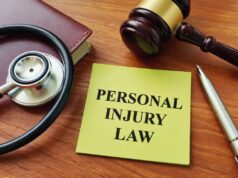Suffering a personal injury accident can be a confusing and stressful experience. Whether it’s a car crash, slip and fall, or workplace injury, knowing the right steps to take immediately after the accident can protect your health and your legal rights. If you need expert guidance, the team at the Law Offices of Jason B. Kessler is ready to help. Visit https://www.kesslerlawyer.com/ for trusted legal support.
Following these top 7 steps after a personal injury accident can help preserve vital evidence and set the foundation for a strong claim with the help of a knowledgeable personal injury lawyer.
1. Seek Medical Attention Right Away
Your health and safety come first. Even if your injuries seem minor, it’s important to get checked by a medical professional as soon as possible. Some injuries, such as internal bleeding or concussions, may not show immediate symptoms but can have serious consequences if left untreated.
Medical records will also serve as critical evidence when you file a claim. A personal injury lawyer will use your medical documentation to prove the extent of your injuries and the treatment required.
2. Report the Accident to the Proper Authorities
If your injury occurred in a car accident or a workplace incident, report it to the police or your employer immediately. Official accident reports provide an unbiased record of what happened and can be essential in supporting your case.
A personal injury lawyer can obtain these reports and help analyze them for key information that strengthens your claim.
3. Document the Scene and Your Injuries
If possible, take photos or videos of the accident scene, any hazards that contributed to your injury, and your visible injuries. Use your phone or a camera to capture details such as skid marks, broken equipment, or warning signs.
Thorough documentation preserves facts that can quickly be lost or altered. A personal injury lawyer can also send investigators to the scene to gather additional evidence.
4. Collect Contact Information from Witnesses
Eyewitnesses can provide valuable testimony that supports your version of events. Be sure to get their full names and contact information so they can be reached later if necessary.
Your personal injury lawyer may contact witnesses to gather statements and use their testimony during settlement negotiations or in court.
5. Avoid Giving Statements to Insurance Adjusters Without Legal Advice
Insurance companies often contact accident victims soon after a crash. While it may seem harmless to cooperate, anything you say can be used against you to reduce your claim.
Consulting a personal injury lawyer before speaking with insurance adjusters ensures your rights are protected and that you do not inadvertently weaken your case.
6. Keep Track of All Expenses and Lost Wages
Injury accidents often result in unexpected expenses like medical bills, rehabilitation costs, and lost income. Keep detailed records and receipts of all related costs. This information is vital for your personal injury lawyer to calculate fair compensation.
Accurate documentation of financial losses strengthens your claim and helps you recover damages beyond just medical expenses.
7. Contact an Experienced Personal Injury Lawyer
Finally, one of the most important steps you can take after a personal injury accident is to reach out to a trusted personal injury lawyer as soon as possible. Lawyers like those at the Law Offices of Jason B. Kessler will review your case, explain your legal options, and guide you through the claims process.
The sooner you involve a skilled attorney, the better your chances of preserving evidence and building a strong case that maximizes your compensation.
Conclusion
Experiencing a personal injury accident is overwhelming, but taking these 7 steps immediately can make a significant difference in the outcome of your case. Remember, your health and legal rights are your top priorities.





